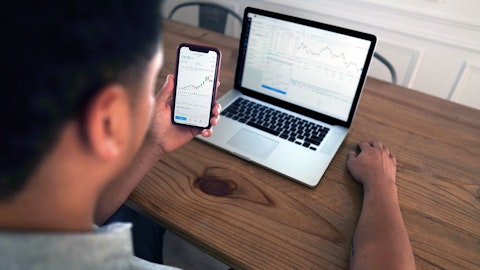That’s our work. Now, even though we recovered capital, which was a great news, we see challenges up ahead. These are typically two. First, there is new for the credit risk. And in our first reading, they can be positive for the capital. But there is a public consultation, which is the operational capital, there is a measure in the way that we allocate it for now. But there is a review being done. And this measure might impact the level of capital of the bank. It’s very early. There is a public consultation. There are several debates happening with the regulator. We’re looking at Basel, several countries delaying the implementation. Our best expectation today, the provision is that, in January 2024, maybe there is a chance that we are going to, in fact, follow up in different geographies, a delay to 2025.
So the bank is doing a provision for their capital looking up ahead. We are not going to fall in the scenario that we’re going to pay for a larger dividend, knowing the prospectively we can have a use because of this event. It’s not materially going to place us below the appetite. We’ll continue to work, so that doesn’t happen. We continue to replenish, but there might be, yes, an impact. There might be an impact. And we’re going to follow up over the next quarters. There is no change in the policy of payout, therefore. We continue to follow the policy of dividends that was published and the capital. Our trend is to continue to grow. And we need on the regulators from the central bank that we do not know all the details on how it’s going to be post the public consultation.
So, the corporate subsequent event, that specific case, about that, of course, yes. Every credit event gives us learnings, whether if it comes from a fraud or if it comes from a worsening of a scenario where we eventually did not predict or did not imagine that would happen. So I would say that that’s part. It’s an expensive learning without a shadow of a doubt, but we always have a learning however expensive it is. So, we want to do a complete review of the processes. We are going to go over the storyline, understand what we could have done, when, where. Here’s an important message. In this period, in the second quarter, well, this is a public case where you don’t talk about the specific case. But since it’s a public case, we reduced BRL 1 billion for this exposure in this specific case.
So there was a discomfort with a series of information. Of course, it’s difficult to imagine that there was a fraud happening in a company with all the characteristics that you know of the company, but we were reducing our exposure, and we reduced BRL 1 billion in the period. Just so you know, the magnitude of the effort, given the operations that were due, we didn’t produce new operations for several reasons. So, this is a learning. So in our opinion of everything that we’ve seen, this is an isolated case. It’s a fraud. We reviewed the portfolio. We reviewed several companies that are using the risk not only in the bank and in the market, we didn’t identify any bad things. This is an isolated thing. It’s isolated case, and we are learning and this is everything that we are doing whenever we incur into an event such as this.
Renato Lulia: And third, now, Gustavo is here. Hi, Gustavo.





